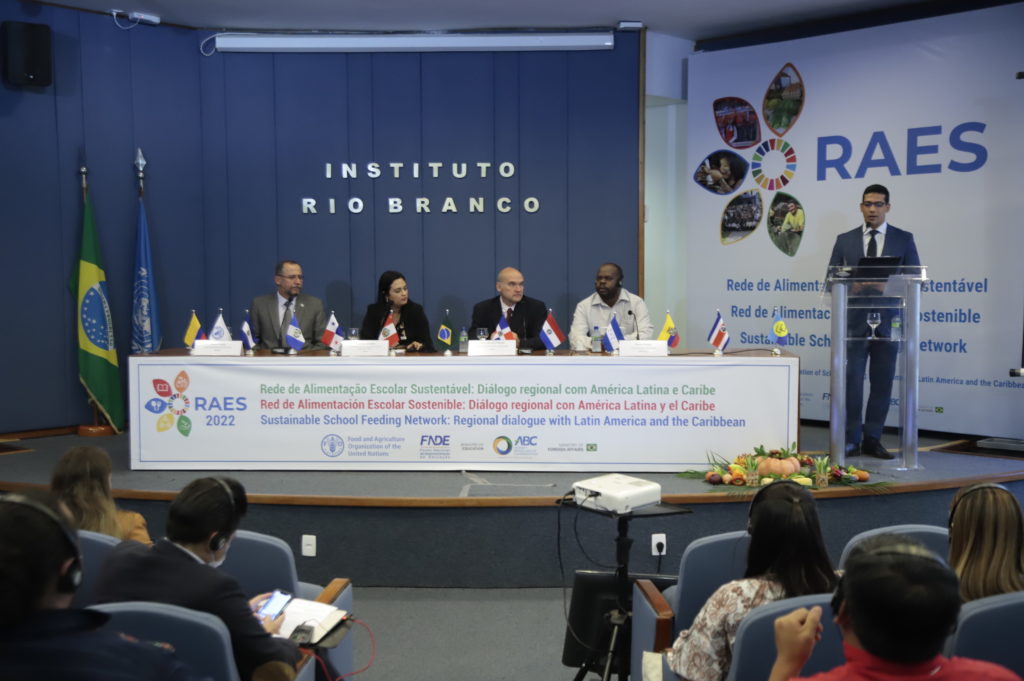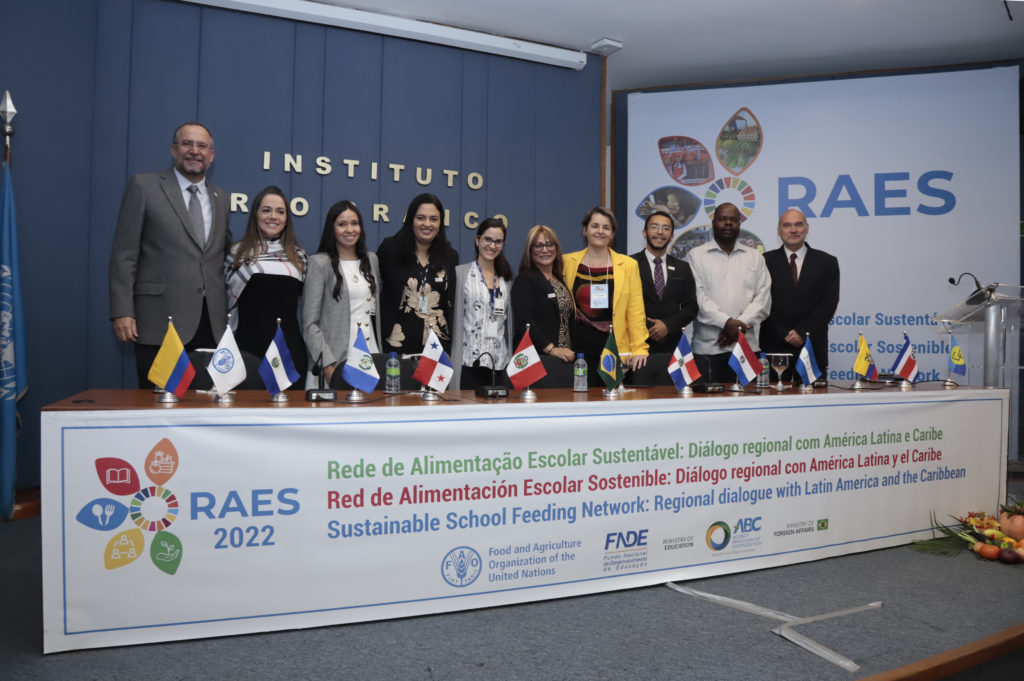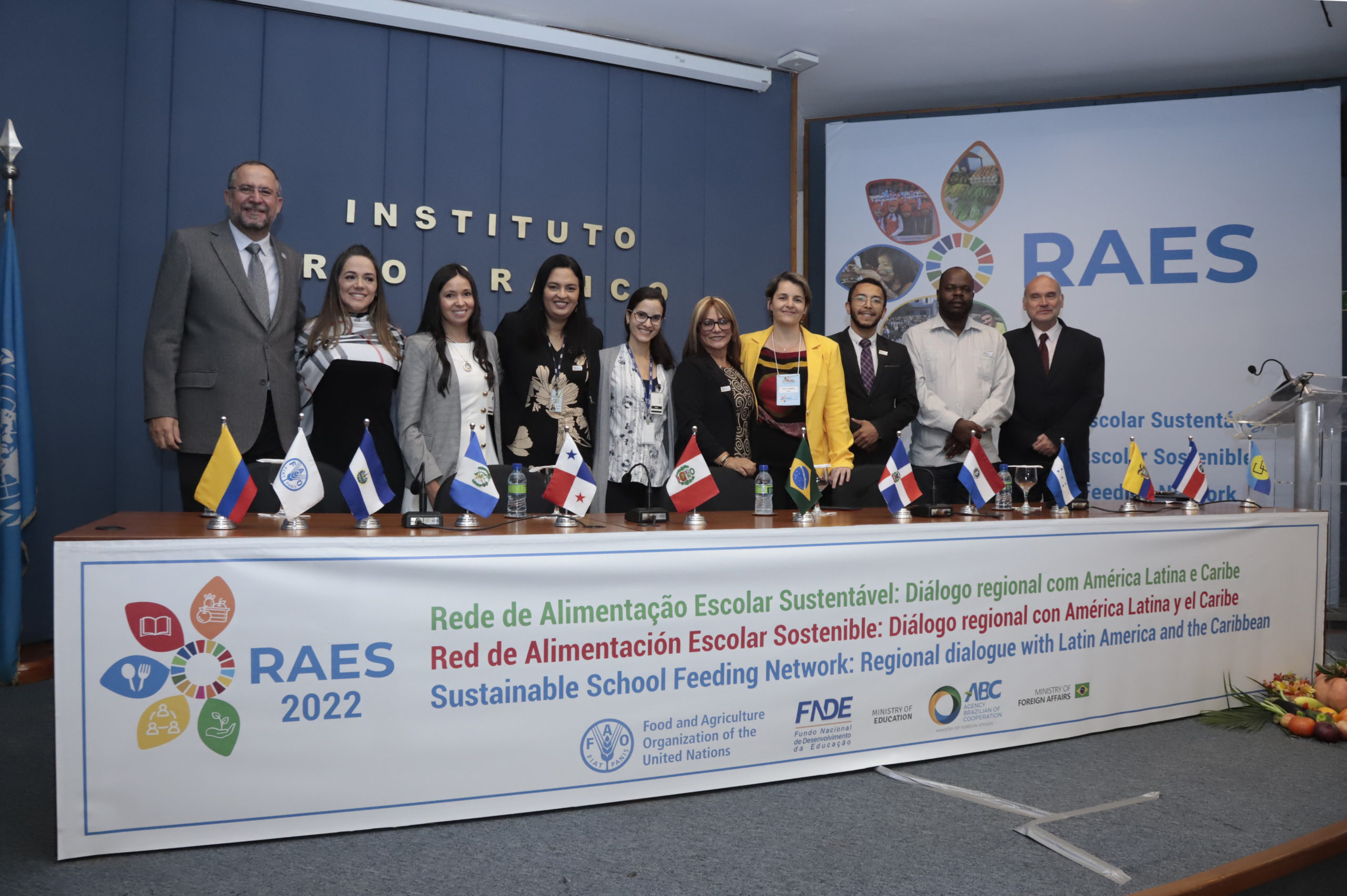With the participation of 10 countries and international institutions, the regional technical committee of the RAES Network was officialized.
Brasília, September 12, 2022 – With the presence of representatives from 10 Latin American countries and Caribbean institutions, gathered in the city of Brasília, Brazil, and the virtual participation of more than 300 people, the Regional Dialogue with Latin America and Caribe 2022, organized by the Sustainable School Feeding Network (RAES, by its acronym in Spanish), formalized the members of the Network’s regional technical committee and promoted the strengthening of the regional commitment in favor of school feeding programmes.
The RAES Network is an initiative of the Government of Brazil, carried out by the Brazilian Cooperation Agency of the Ministry of Foreign Affairs (ABC/MRE), by the National Fund for Educational Development of the Ministry of Education (FNDE), with the support of Food and Agriculture Organization (FAO) and managers from member countries. The Network has the Executive Secretariat of the project Consolidation of School Feeding Programmes in Latin America and the Caribbean, implemented within the scope of the Brazil-FAO International Cooperation Programme.

At the opening, Plinio Pereira, deputy responsible for trilateral South-South cooperation with international organizations of the ABC/MRE, highlighted that the partner countries of the RAES share common objectives, such as the strengthening and consolidation of school feeding programmes. According to Pereira, important steps have been taken to give the Network a scale, such as the designation of focal points, the political commitments of the participating countries and the implementation of the trilingual virtual platform (www.redraes.org), which seeks to share experiences and information in Portuguese, Spanish and English.
FAO’s representative in Brazil, Rafael Zavala greeted the Network’s executing partners and praised the experience of more than 60 years of the National School Feeding Programme of Brazil – PNAE. “This institutional experience of the FNDE and the PNAE are the blood of this network”. Zavala said that each RAES representative is like a node in a network in which everyone is united. “For this network to reach far and strong, it will depend on the support and strength of each of you”.
Solange Fernandes, PNAE coordinator at the FNDE, said that RAES is an instrument to support countries to overcome the challenges of school feeding policy, “through the socialization of knowledge, successful experiences and for the training of human resources and strengthening institutions.” For Solange Fernandes, RAES empowers managers and qualifies technicians to guarantee the sustainability of the SFP over time.
Edenilza Carvalho, representing the FNDE, ratified the institution’s commitment to RAES and valued the exchange of experiences. “We recognize the importance of dialoguing and the opportunity that RAES Network gives us to sit down and debate”.

Representing the participating countries and the Caribbean Community (CARICOM), Shaun Baugh, manager of agricultural and agro-industrial development programmes, said that food and nutrition security is one of the most important areas for the CARICOM. “Without healthy food, students find it difficult to learn. Food with good nutrition, professional monitoring and quality education is needed. This is what RAES has as its objective in all Latin American and Caribbean countries”.
Regulatory frameworks
The seminar had the virtual participation of Manuela Cuvi, legal officer of the FAO Office in Latin America and the Caribbean, who spoke about the importance of regulatory frameworks for school feeding policies, detailing the regional scenario and citing specific cases. “Cooperation is very valuable for the development of legal frameworks for school feeding”, she said. “School feeding laws must be state policies and not policies of governments”.
Committee
The members of the RAES directive committee were also officially announced, including those present in the auditorium and those who participated virtually. “The RAES is strengthened and consolidated through the officialization of its regional committee members”, said Najla Veloso, coordinator of the project Consolidation of School Feeding Programmes in ALC.
“This dialogue, which included an international mission of 10 LAC countries and institutions to Brazil, reinforced the commitment not only of the countries to promote and continue to develop the RAES together, but also reaffirmed the desire of the FNDE, ABC and FAO to continue cooperating towards sustainable school feeding programmes and the transformation of conventional and exclusionary agrifood systems in favor of inclusive and resilient systems”, concluded Veloso.
Content produced by the team of the project Consolidation of School Feeding Programmes in LAC



